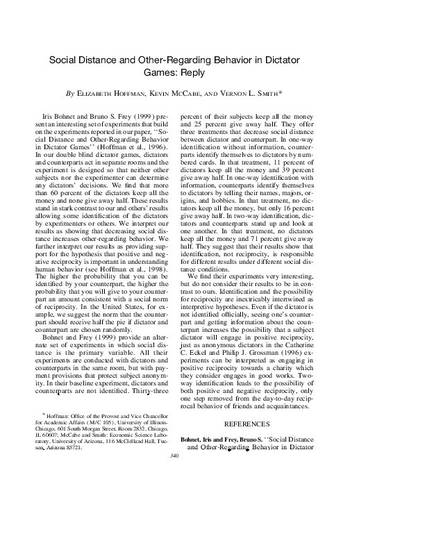
Article
Social Distance and Other-Regarding Behavior in Dictator Games: Reply
American Economic Review
(1999)
Abstract
Iris Bohnet and Bruno S. Frey (1999) present an interesting set of experiments that build on the experiments reported in our paper, ‘‘Social Distance and Other-Regarding Behavior in Dictator Games’’ (Hoffman et al., 1996). In our double blind dictator games, dictators and counterparts act in separate rooms and the experiment is designed so that neither other subjects nor the experimenter can determine any dictators’ decisions. We find that more than 60 percent of the dictators keep all the money and none give away half. These results stand in stark contrast to our and others’ results allowing some identification of the dictators by experimenters or others. We interpret our results as showing that decreasing social distance increases other-regarding behavior. We further interpret our results as providing support for the hypothesis that positive and negative reciprocity is important in understanding human behavior (see Hoffman et al., 1998).
Disciplines
Publication Date
March, 1999
DOI
10.1257/aer.89.1.340
Publisher Statement
This article is published as Hoffman, E., McCabe, K., Smith, V.L., Social Distance and Other-Regarding Behavior in Dictator Games: Reply., American Economic Review. 1999, 89(1); 340-41. DOI: 10.1257/aer.89.1.340. Posted with permission.
Citation Information
Elizabeth Hoffman, Kevin McCabe and Vernon L. Smith. "Social Distance and Other-Regarding Behavior in Dictator Games: Reply" American Economic Review Vol. 89 Iss. 1 (1999) p. 340 - 341 Available at: http://works.bepress.com/elizabeth-hoffman/29/
